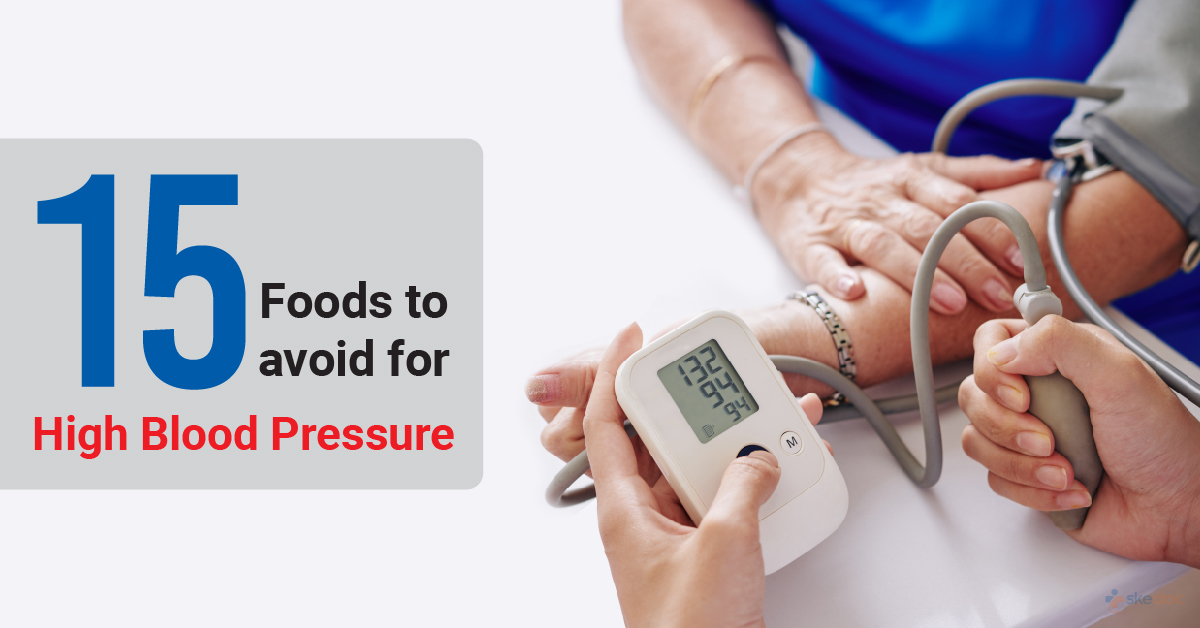Allergy
Blood Diseases
Bone & Joints
Brain
Cancer
Child Care
Cosmetic Surgery
Diabetes
Endocrinology
ENT
Eye
Gen Medicine
General Surgery
Heart
Kidney
Lifestyle
Liver & Digestive
Lung
Men’s Health
Mental health
Physiotherapy
Rheumatology
Skin and hair
Sleep Disorders
Spine
Transplant
Women Health
Thyroid
Vascular Surgery
Foods to avoid for high blood pressure

Despite taking medicine and exercising every day, is your blood pressure high? Your diet could be the problem! Our blood pressure is strongly influenced by the stuff we eat. Hence, avoiding certain meals with high blood pressure will help you control your hypertension naturally. Scroll down to read on and learn more about the foods you must consume and foods to avoid high blood pressure.
What is Prehypertension?
Prehypertension is defined as blood pressure between 120/80 and 139/89 millimetres of mercury (mmHg), the standard unit of measurement for blood pressure. High blood pressure is risky since it makes your heart work too hard, stiffens the artery walls, and can result in brain haemorrhage, renal disease, and perhaps even kidney failure. High blood pressure can cause Cardiovascular disease and renal problems, stroke, and visual impairment if not treated.
What causes High Blood Pressure?
Hypertension or high blood pressure is a condition that affects the arteries and thickens the heart walls, making the heart work harder to pump blood. High blood pressure raises the risk of heart attack, stroke, and other major health issues if left untreated. Research shows that high blood pressure can be prevented— and lowered—by following the Dietary Approaches to Stop Hypertension (DASH diet) eating plan containing a Low-sodium diet.
What Impact Does Your Food Have on Your Blood Pressure Levels?
The food you consume has an impact on every element of your health. Knowing the connection between your diet and blood pressure might help you choose the proper meals. This will also help you control your hypertension.
- Sodium Intake: When you consume too much sodium, the body conserves the water needed to balance off the extra sodium. Water retention in the body can cause stress on the vascular system, resulting in higher blood pressure readings. It is always ideal to avoid Sodium-free seasonings. You can pick mixed herbs or oregano as salt substitutes to enhance the taste.
- Saturated fats: The elevated pressure in the blood vessels damages the walls of arteries in case of severe hypertension. Therefore, saturated and trans fats may build up in these damaged artery walls, forming plaque. This plaque narrows and plugs the blood vessels, increasing blood pressure and putting you at risk of heart disease.
- Sugars: In the long term, excessive blood sugar levels can cause arterial wall damage, resulting in cholesterol and fat deposits that can obstruct the blood arteries. As a result, you are more likely to acquire hypertension and cardiovascular disease.
- Carbohydrates: Carbohydrate-rich foods digest more quickly than others and require more blood flow to break down the complex. As a result, the body diverts blood from other parts to the gut, which may cause a dip in blood pressure.
- Alcohol: Alcohol has a variety of effects on the body. It causes electrolyte imbalances and dehydration and interferes with the activity of several hormones that govern renal processes. Any of these negative factors can raise the blood pressure.
What are Blood pressure-lowering foods?
Consuming potassium-rich foods can promote lowering blood pressure - according to the American Heart Association. The following is the list of the best foods to lower blood pressure:
- Melons (cantaloupe or honeydew)
- Apricots
- Oranges
- Fat-free or low-fat dairy products
- Avocados
- Molasses
- Tomatoes
- Potatoes
- Raisins
- Dates
- Mushrooms
- Prunes
- Spinach and green leafy vegetables: Consuming at least 3 to 4 servings of different fruits and vegetables daily will help lower your blood pressure. Fresh fruits and vegetables are high in necessary micro and macronutrients, and eating them daily can help you lose weight and decrease your blood pressure, blood sugar, and cholesterol levels.
- Fish: Fish high in omega-3 fatty acids, such as mackerel, salmon, and cod, can help lower cholesterol and blood pressure levels. Lean meats (meats with the fat removed) are high in protein and help and also help to decrease blood pressure.
- Legumes: Legumes, lentils, beans, and pulses are high in magnesium, potassium, protein, and fiber, all of which help to decrease blood pressure and cholesterol.
What Foods to Avoid if you have high blood pressure?
- Highly salty food: Meals with high sodium content, such as fries, chips, and namkeen, are the main foods to avoid if you have high blood pressure as they cause water retention, resulting in an elevation of blood pressure levels.
- Caffeine: Avoid sugary drinks and caffeine-rich beverages such as sodas, coffee, and tea, as caffeine can constrict your blood vessels, increasing stress and contributing to blood pressure levels.
- Highly processed food: Processed meat, Junk foods, and other preserved foods are high in salt and fat and lose most nutritional value when cooked. Certain foods can raise your risk of cardiovascular disease and hypertension. As a result, they are one of the most important high-blood-pressure meals to avoid.
- Pickled or preserved food: Pickled foods are often kept in a brine (salt) solution or sugar syrup to inhibit microbe development and increase shelf life. Because of the high levels of salt and glucose in these meals, they can raise your blood pressure and blood glucose levels.
- Food high in saturated (Refined carbohydrates) or trans-fats: Foods heavy in saturated and trans fats, such as warmed palm oil, butter, ghee, coconut oil, bacon, and margarine, can raise your cholesterol and restrict your arteries, resulting in blood pressure.
- Frozen meals or canned food: Most frozen dinners and canned foods contain high levels of salt and sugar.
- Red meat: When red meat is digested, the substances released in your intestines might raise your blood pressure. Red meat such as beef, hog, mutton, and venison are also heavy in saturated fats, which can elevate your cholesterol.
- Added sugars: Items high in added sugars, such as sweets, chocolate, jams, candies, cookies, and ice creams, induce high blood sugar levels, which can contribute to hypertension in the future. Sugary foods can cause you to gain weight, raising your blood pressure again.
- Condiments and dressings: Most condiments, such as ketchup, soy sauce, and hot sauce, are high in salt and sugar and can contribute to blood pressure. When purchasing these items, check the labels to ensure salt levels.
- High-fat foods: High-fat foods, such as milk, cheese, fatty fish, butter, meat, and yoghurt, can increase cholesterol levels and cause weight gain, putting you at risk for heart disease.
- Energy drinks: Energy drinks are used before and after exercise to replenish electrolytes in the body. Avoid them if you have hypertension, as they might harm your health.
- Baked goods and confectioneries: Most baked products, such as candies, pies, Puffs, cakes, biscuits, and bread, contain sugars, yeast, and saturated fats, aggravating blood pressure. These foods should be taken in moderation to avoid excessive blood sugar and cholesterol levels.
- Grapefruit: The hypertension medication may react with grapefruit components, affecting the absorption of medicines into your circulation. This might impact the efficacy of your medications.
Quick Overview
- Your diet has a significant impact on blood pressure regulation.
- When ingested, sodium, saturated fats, sugar, carbs, and alcohol can affect your blood pressure.
- If you have high blood pressure, you should avoid excessive caffeine, salty fried foods, pickled, overly processed foods or preserved foods, foods high in saturated or trans-fats, frozen foods or canned foods, Fast food, alcohol, bread, red meat, condiments and dressings, high-fat foods, energy drinks, grapefruit, baked goods, confectioneries, and added sugars.
- To reduce your high blood pressure, include whole grains, fish, fruits and vegetables like beans, legumes, lentils, Cured meats or lean meat, nuts, potassium-rich foods and seeds in your diet.
- Check the Food labels before you buy processed or packed foods.
Prevention: Other ways For Blood Pressure Management
In addition to a hypertension diet, various methods for lowering blood pressure are available.
- Exercise Routine
- Regular exercise is one of the most effective ways to reduce blood pressure. "At least 150 minutes per week of low-intensity exercise should be your starting objective.
- Dr Gaesser suggests walking for 30-45 minutes 3-5 times a week or the equivalent of physical activities such as swimming, cycling, or running to help maintain a healthy weight.
- Supplements
- Vitamins C, B2, and B9 supplements can help lower blood pressure.
- A nutritional supplement that contains L-arginine, which creates nitric oxide, which is a powerful vasodilator that widens blood vessels
Conclusion
Lack of symptoms and high blood pressure can harm you before you even realise it, so get frequent blood pressure checks. Medication is sometimes used to treat this disease. Discuss your treatment choices with your doctor, including medicine, lifestyle modifications, or other treatments. It is crucial to consult your doctor before using any herbs or supplements. Moreover, do not discontinue any prescription drugs without first consulting with your healthcare professional.
It is extremely important to note that insufficient proof supports using herbal supplements instead of prescription drugs to manage high blood pressure. There has been very little human research using plants and herbs.
FAQ’s
Q. Can high blood pressure be managed just by diet?
A. While essential, nutrition alone might not be sufficient to control high blood pressure.
Q. What are the primary factors that lead to high blood pressure?
A. Genetics, lifestyle decisions, and underlying medical issues are just a few potential causes of high blood pressure.
Q. Why should we avoid eating processed meats?
A. High salt content and preservative levels in processed meats can raise blood pressure.
Q. Can consuming alcohol affect blood pressure?
A. Indeed, consuming too much alcohol can increase blood pressure and hypertension risk.
Q. Why does consuming too much salt cause high blood pressure?
A. Salt includes sodium, which can lead to a rise in blood pressure and a fluid retention increase.
Q. Can dairy products with a lot of fat make blood pressure worse?
A. Excessive consumption of high-fat dairy products can aggravate blood pressure and raise cholesterol levels.
Q. Does sugar raise blood pressure as well?
A. Eating a lot of sugar increases your chances of gaining weight, developing insulin resistance, and getting high blood pressure.
Q. What justifies restricting packaged snacks?
A. Preservatives, bad fats, and high salt content are frequently found in packaged foods, which can raise blood pressure.
Q. Is it feasible to enjoy meals while treating high blood pressure?
A. Absolutely! If you make the correct choices, you can regulate your blood pressure while enjoying tasty, healthy foods.
Was this article helpful?
YesNo




